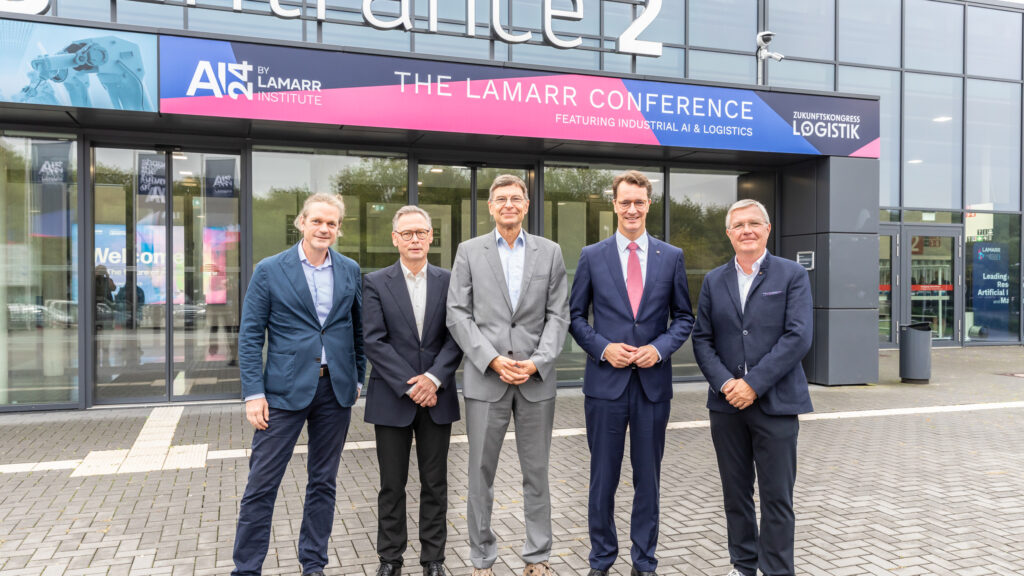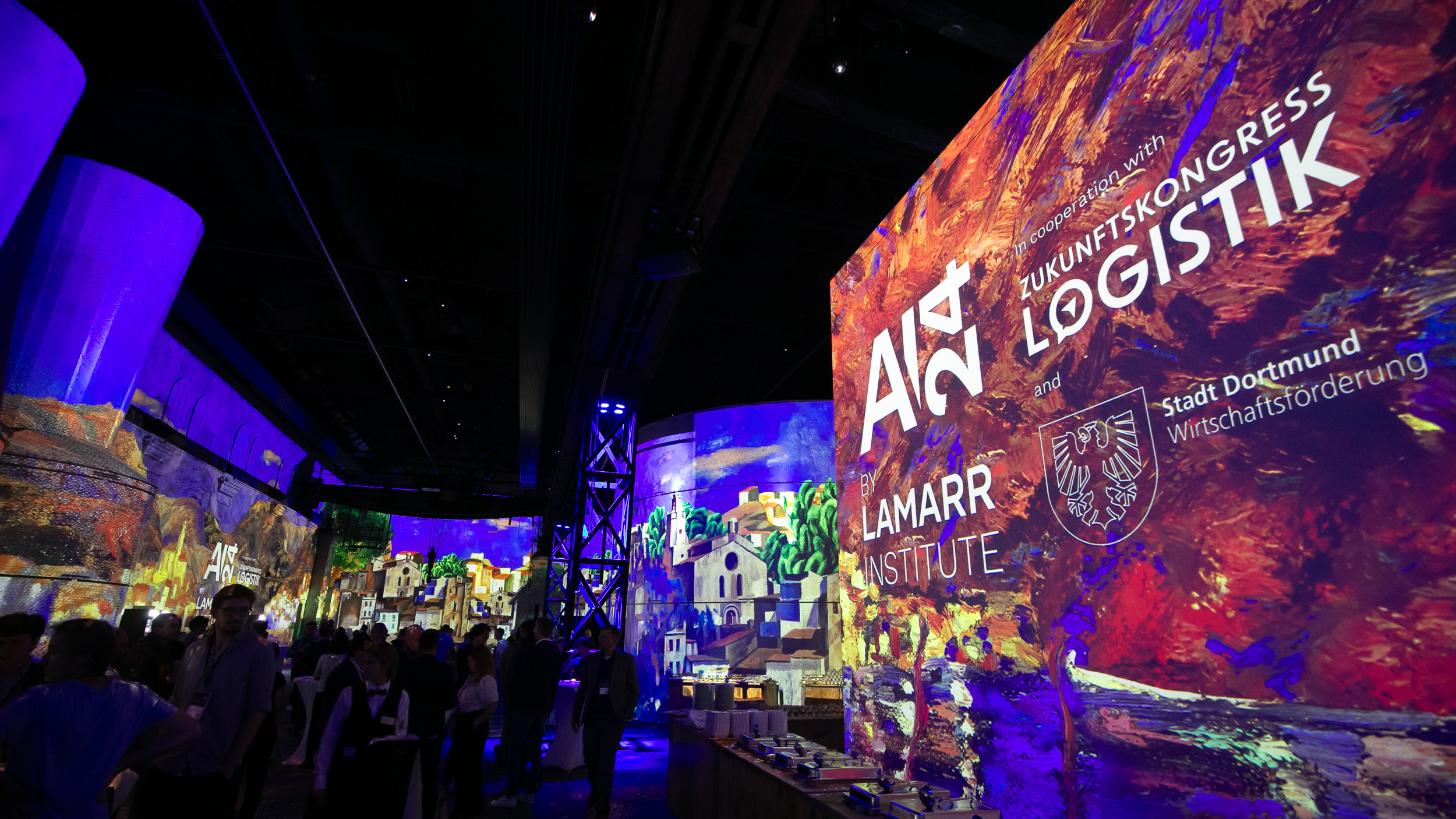
Today marks the start of “AI24 – The Lamarr Conference” at the Westfalenhallen in Dortmund, the first scientific conference in Central Europe focused on the application of Artificial Intelligence (AI). In collaboration with the long-established “Zukunftskongress Logistik – 42. Dortmunder Gespräche,” which has been held in Dortmund for over 40 years, the event on September 4th and 5th brings together around 700 participants to explore the latest developments and future perspectives of AI in various fields. These range from generative AI models and current AI technologies for industry and logistics to diverse research findings and global trends in science, business, and society. The two-day conference began with the presentation of the inaugural “Lamarr Award” to the internationally renowned AI expert, Professor Dr. Dr. h.c. mult. Sebastian Thrun.
“AI algorithms and their Machine Learning capabilities will shape future competition, particularly in industries like logistics,” said Professor Dr. Michael ten Hompel, Co-Director of the Lamarr Institute, during the conference’s opening. “That’s why we’ve brought together the best minds from research, industry, and politics at AI24 – to create new communities and discover collaborative opportunities to actively shape the future of applied AI.” Lamarr Co-Director Professor Dr. Stefan Wrobel added, “We can only advance AI with sustainably excellent, responsible, and application-oriented top-tier research. I’m thrilled that we’ve succeeded in bringing together outstanding experts from international science and industry here in Dortmund to discuss the latest trends, groundbreaking technologies for the economy, and the necessary steps for effective AI education.”
Following welcome addresses by Thomas Westphal, Mayor of Dortmund; Bettina Stark-Watzinger, Federal Minister of Education and Research; and Ina Brandes, Minister of Culture and Science of the State of North Rhine-Westphalia, participants experienced the conference’s first major highlight: first presentation of the “Lamarr Award” to the internationally acclaimed pioneer in AI, robotics, autonomous driving, and digital education, Sebastian Thrun, Professor of Artificial Intelligence at Stanford University and former Vice President at Google. “We already have massive AI innovations in the pipeline that will gradually help us all lead better lives,” said Thrun in his keynote, urging, “Germany should position itself as a global leader in this fundamental technology by fostering a new level of curiosity and openness across society.”

How Artificial Intelligence is Transforming Research, Business, and Society
The rest of the program offered participants exciting keynote lectures and panel discussions on topics such as generative AI, AI education for future generations of researchers and practitioners, and the application of AI in industry and logistics. The transformative potential of the technology was made clear, particularly in the close cooperation between researchers and practitioners. Dr. Magnus Sahlgren, Research Director at AI Sweden, provided a European perspective on generative AI in his keynote, while Professor Dr. Michael Henke, Managing Director of the Fraunhofer IML, gave an introduction to the potential of AI in industry and logistics, outlining the path towards a digital AI continuum.
The first day of the conference concluded with an evening event hosted in collaboration with the Economic Development Agency Dortmund at the atmospheric Phoenix des Lumières venue, which also provided the setting for the presentation of the “Digital Logistics Award.”
Top AI Research With Global Impact – From North Rhine-Westphalia and Beyond
The second day of the event on September 5th was opened by Hendrik Wüst, Member of the State Parliament and Minister-President of North Rhine-Westphalia. In advance of the conference, Wüst advocated for strengthening the connection between AI research and industry: “North Rhine-Westphalia is consistently taking the path from coal to AI: laboratories and research facilities are now located where hard coal was once mined. Where brown coal is still being mined today, data centers and data hubs are being planned. For North Rhine-Westphalia, the research and application of AI is a crucial topic for the future. AI is also a central driver for our economic region, as the structural change in many areas of the state shows. The state has set itself an ambitious goal: We want to become Europe’s leading digital region. That’s why it’s essential that the Lamarr Institute provides the right foundation by combining networking, internationalization, and close ties to industry to explore both the scientific foundations and industrial applications of AI.”

Keynote lectures on large language models for dialogue systems by Amazon AGI expert Professor Dr. Jens Lehmann and AI in astrophysics by Professor Dr. Phil Diamond from the Square Kilometre Array Observatory showcased perspectives for a new generation of AI assistants and the impact of AI on groundbreaking international research collaborations. The afternoon offered a wide-ranging program with parallel thematic and workshop sessions led by leading national and international experts. Participants had the opportunity to delve deeper into various current AI application areas and solutions: The “Fellows” of the Lamarr Institute – six outstanding AI researchers from North Rhine-Westphalia – provided insights into the latest AI research from the region. Sessions were also offered on topics such as robotics, specific AI applications in the natural sciences (including physics and life sciences with a focus on pharmaceuticals), and in industry and logistics. Other key topics included regulatory tools for AI, such as the European Union’s “AI Act,” the use of “foundation models” and “large language models,” and explainable AI.
Additional Statements
Ina Brandes, Minister of Culture and Science of the State of North Rhine-Westphalia:
“Artificial intelligence is already a fixed part of our everyday lives. I’m confident it will help make people’s lives safer and more comfortable in many areas – with new, individually tailored diagnostic and therapeutic options for each patient, with smart solutions for better and cleaner mobility, with intelligent energy storage, and with new efficient teaching and learning methods for our students. At the same time, the rapid development of AI brings ethical challenges. As the state of North Rhine-Westphalia, we are investing in important future topics to create a counterbalance to countries and large corporations that do not share our values.”
Professor Dr. Michael Henke, Managing Director of the Fraunhofer IML:
“Artificial Intelligence is increasingly helping us fully virtualize the value creation of our planet and its interconnected logistics process chains. This creates a digital continuum – a closed loop from planning and disposition to performance accounting and payment. The advantages of such a development are clear: Our supply chains, networks, and logistics would achieve a level of security, resilience, and adaptability unprecedented in human history. We’ve been focusing on this at the Dortmund science hub for several years now, and we will continue to do so because we are convinced that AI will accelerate this development, and we will drive it forward from Dortmund.”
Professor Dr. Jakob Rehof, Co-Director of the Lamarr Institute:
“Artificial Intelligence creates new, direct connections between basic research (in computer science, mathematics, and statistics) and applications both in business and other sciences. Innovations emerge in a closely and quickly timed cycle: New AI research results are experimentally implemented in applications, and applications create demands that lead to new research results. This is a huge potential that can only be tapped with top-tier AI research. At Lamarr, we are particularly pleased to be able to make a significant contribution to this for North Rhine-Westphalia and Germany.”
Professor Dr. Christian Bauckhage, Co-Director of the Lamarr Institute
“Sustainable excellence in AI research and its applications is only possible if the education of the next generation of highly qualified scientists is also sustainably excellent. That’s why the staff at the Lamarr Institute are strongly committed to this area, offering numerous initiatives for school students, university students, and continuing education programs.”
Further Information:
About the Lamarr Institute:
The Lamarr Institute is shaping a new generation of Artificial Intelligence (AI) that is powerful, sustainable, trustworthy, and secure, contributing to solving fundamental challenges in business and society. As one of Germany’s central AI competence centers, the Lamarr Institute stands for value-based, internationally competitive, and application-oriented top-tier research and is actively engaged at the regional, national, and international levels in science, education, and technology transfer.
The research institute is supported by the Technical University of Dortmund, the University of Bonn, and the Fraunhofer Institutes for Intelligent Analysis and Information Systems IAIS in Sankt Augustin and for Material Flow and Logistics IML in Dortmund. The Lamarr Institute is permanently funded under the German Federal Government’s AI Strategy by the Federal Ministry of Education and Research (BMBF) and the state of North Rhine-Westphalia.
Background Information on the Future Logistics Congress:
For more than 40 years, the “Zukunftskongress Logistik – Dortmunder Gespräche” has provided a unique platform for exchange between science and industry. With the expert knowledge of its organizers and partners, the traditional congress offers an annual glimpse into the future of logistics, bringing together the latest developments from society, research, and practice. Thanks to its discussion-oriented format, it serves as a networking platform for experts from various disciplines.
Impressions from the Event



















© Fraunhofer IML
Press Contacts
Lamarr Institute for Machine Learning and Artificial Intelligence
Katrin Berkler, Head of Press and Public Relations
c/o Fraunhofer Institute for Intelligent Analysis and Information Systems IAIS
Phone: +49 2241 14-2252
Ann-Kathrin Oster, Head of Networking
c/o TU Dortmund
Phone: +49 231 755-5177
Email: in**@**************te.org
Zukunftskongress Logistik
Bettina von Janczewski, Head of Press and Media
Phone: +49 231 9743-193
Julian Jakubiak, Press Officer
Phone: +49 231 9743-612
c/o Fraunhofer Institute for Material Flow and Logistics IML
E-Mail: pr****@************er.de